
Fuzzy Optimization and Decision Making
Scope & Guideline
Exploring the Intersection of Logic, Software, and Optimization
Introduction
Aims and Scopes
- Fuzzy Logic Applications:
The journal emphasizes the application of fuzzy logic in various fields, including decision support systems, control theory, and data analysis, enabling the handling of uncertainty and imprecision in real-world scenarios. - Uncertainty Modeling:
A core focus is on developing models that incorporate various forms of uncertainty, such as fuzzy numbers, uncertain differential equations, and probabilistic models, which are essential for accurate decision-making. - Optimization Techniques:
The journal covers optimization methodologies that are robust to uncertainty, including linear and nonlinear programming, multi-objective optimization, and decision-making under risk, often utilizing fuzzy and uncertain parameters. - Interdisciplinary Research:
Research published in the journal often spans multiple disciplines, integrating insights from economics, engineering, environmental science, and public health, reflecting the diverse applications of fuzzy optimization. - Real-World Applications:
The journal prioritizes studies that apply theoretical advancements to practical problems, such as supply chain management, financial forecasting, and medical resource allocation, demonstrating the utility of fuzzy optimization in addressing societal challenges.
Trending and Emerging
- Fuzzy and Uncertain Time Series Analysis:
There is a growing trend in utilizing fuzzy and uncertain time series models for forecasting applications, particularly in the context of economic and environmental data, which is crucial for informed decision-making. - Sustainable Development and Environmental Applications:
Research focusing on sustainability, especially in carbon pricing and resource allocation in uncertain environments, is increasingly prevalent, aligning with global priorities on climate change and resource management. - Machine Learning and AI Integration:
The integration of fuzzy logic with machine learning techniques is becoming more prominent, particularly in areas such as predictive analytics and decision support systems, reflecting technological advancements and the demand for intelligent systems. - Healthcare and Public Health Decision Making:
Studies addressing decision-making in healthcare, particularly in response to public health emergencies like COVID-19, are on the rise, emphasizing the importance of fuzzy optimization in managing health resources and strategies. - Complex Systems and Network Optimization:
There is an emerging focus on optimizing complex systems and networks, particularly in logistics and supply chain management, using fuzzy and uncertain frameworks to enhance decision-making under complexity.
Declining or Waning
- Classical Optimization Techniques:
There seems to be a reduced emphasis on classical optimization techniques that do not incorporate fuzzy or uncertain elements, as researchers increasingly prioritize methods that address real-world complexities. - Traditional Statistical Methods:
Statistical methods that do not account for uncertainty or fuzzy logic are becoming less frequent, as the field moves towards more robust and adaptable approaches for analyzing data with inherent uncertainties. - Static Decision-Making Models:
Static models that do not accommodate dynamic changes in uncertain environments are appearing less often, reflecting a trend towards more adaptive and responsive decision-making frameworks. - General Theoretical Studies:
The journal is seeing fewer publications focused solely on theoretical explorations without practical applications, as the trend shifts towards research that demonstrates real-world impact and applicability.
Similar Journals
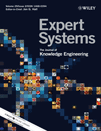
EXPERT SYSTEMS
Elevating Knowledge in Control, Systems Engineering, and Theory.EXPERT SYSTEMS is a prestigious journal published by WILEY, dedicated to advancing the fields of Artificial Intelligence, Computational Theory and Mathematics, Control and Systems Engineering, and Theoretical Computer Science. Established in 1984, this journal has consistently provided a platform for rigorous research, showcasing innovative methodologies and applications that drive the future of intelligent systems. With an impressive impact factor and Scopus rankings placing it among the top quartiles within its categories, EXPERT SYSTEMS is a vital resource for researchers, professionals, and students seeking to deepen their understanding of complex systems and their applications. The journal is not currently an Open Access publication, emphasizing its commitment to high-quality, peer-reviewed research that impacts the global academic community. With a convergence year extending to 2024, it prepares to continue its legacy as a cornerstone of knowledge in these dynamic fields.
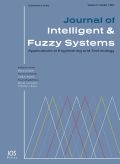
JOURNAL OF INTELLIGENT & FUZZY SYSTEMS
Bridging Theory and Application in Intelligent SystemsJOURNAL OF INTELLIGENT & FUZZY SYSTEMS is a premier publication dedicated to advancing the field of artificial intelligence, fuzzy systems, and related engineering disciplines. Published by IOS PRESS, this journal plays a vital role in disseminating innovative research and methodologies that push the boundaries of knowledge from its inception in 1993 through 2024. With an impact factor underscoring its significance, it maintains a strong reputation for quality and rigor, achieving Q3 in Artificial Intelligence and Q2 in Engineering (miscellaneous) as reported in 2023. Researchers can access invaluable insights into current trends and applications, making it an essential resource for professionals and scholars alike. The journal welcomes contributions that bridge theoretical advancements and practical implementations, fostering a community of interdisciplinary collaboration. Situated in the heart of the Netherlands, the JOURNAL OF INTELLIGENT & FUZZY SYSTEMS is committed to enhancing understanding in the realms of mathematics, statistics, and probability, with Scopus rankings reflecting its competitive edge across various fields.
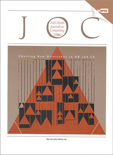
INFORMS JOURNAL ON COMPUTING
Bridging Theory and Practice in Technology ApplicationsINFORMS JOURNAL ON COMPUTING, published by INFORMS, stands as a quintessential platform for disseminating cutting-edge research and innovative methodologies in the realms of computing, information systems, and operations research. Since its inception in 1996, this journal has consistently maintained a prestigious Q1 quartile ranking across multiple categories, including Computer Science Applications, Information Systems, and Management Science and Operations Research, reflecting its significant impact and relevance in the academic community. The journal serves as a vital resource for researchers, professionals, and students alike, fostering interdisciplinary dialogue and the advancement of theoretical and practical contributions in computing. With no open access restrictions, it remains accessible to those engaged in the pursuit of knowledge and innovation in a rapidly evolving field. Housed in the United States, the journal continues to thrive, enriching the discourse in technology and its applications until 2024 and beyond.
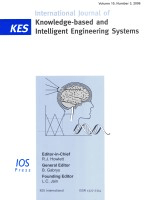
International Journal of Knowledge-Based and Intelligent Engineering Systems
Exploring the Synergy of AI and Engineering ExcellenceThe International Journal of Knowledge-Based and Intelligent Engineering Systems, published by IOS PRESS, serves as a vital platform for scholars and practitioners involved in the fields of Artificial Intelligence, Control and Systems Engineering, and Software Development. Founded in 2004 and continuously publishing through to 2024, this journal stands out with its comprehensive coverage of innovative methodologies and applications that leverage knowledge-based systems. Although currently listed in Q4 for Artificial Intelligence and Q3 for Control and Systems Engineering, it features an increasing trajectory in the scientific community, as indicated by its rankings in Scopus—which reflects the growing importance of intelligent engineering systems in contemporary research. With a commitment to disseminating cutting-edge research without open access constraints, this journal is essential for those seeking to understand and contribute to advancements in intelligent systems. Join a global community of researchers and industry leaders by engaging with the latest findings shared in this well-regarded journal.

KYBERNETIKA
Fostering Academic Excellence in Cutting-Edge Disciplines.KYBERNETIKA is a distinguished journal published by KYBERNETIKA in the Czech Republic, dedicated to advancing the fields of Artificial Intelligence, Control and Systems Engineering, Electrical and Electronic Engineering, Information Systems, Software, and Theoretical Computer Science. Since its inception in 1972, it has played a pivotal role in disseminating research findings and innovative theories, providing a platform for academic discourse and groundbreaking studies. The journal has evolved through various periods, including converged years from 1972 to 1989 and 1996 to 2024, showcasing a commitment to ongoing scholarship within the vibrant academic community. Its current standing in multiple categories reflects its importance, being ranked in the third and fourth quartiles in various disciplines, thus appealing to diverse researchers and professionals. While KYBERNETIKA does not offer Open Access, it remains a valuable resource for those interested in the latest developments in its respective fields. The address for submissions and inquiries is POD VODARENSKOU VEZI 4, PRAGUE 8 182 08, CZECH REPUBLIC. Engage with this invaluable repository of knowledge to stay at the forefront of research and innovation.

Grey Systems-Theory and Application
Unlocking the Potential of Grey Systems Theory and ApplicationGrey Systems - Theory and Application is a premier journal dedicated to advancing the field of grey systems theory, which plays a pivotal role in addressing uncertainties in complex systems across various domains. Published by Emerald Group Publishing Ltd in the United Kingdom, this journal has established itself as a respected platform for innovative research, boasting a commendable 2023 impact factor reflected in its Q2 categorization in applied mathematics, computer science, and control systems engineering. With Scopus rankings placing it in the top tiers of its fields, it provides a robust forum for researchers, professionals, and students to explore theoretical developments and practical applications. The journal, which has been converged from 2011 to 2024, encourages open conversations on the theoretical underpinnings and real-world implications of grey systems, making it an essential resource for those looking to deepen their understanding and contribute meaningfully to this dynamic area of study.

Mathematical Foundations of Computing
Bridging Mathematics and Computing for a Digital TomorrowMathematical Foundations of Computing, published by the American Institute of Mathematical Sciences (AIMS), is a distinguished open-access journal that has been actively disseminating influential research in the fields of Artificial Intelligence, Computational Mathematics, Computational Theory and Mathematics, and Theoretical Computer Science since its inception in 2009. With its E-ISSN 2577-8838, this journal is committed to providing researchers and practitioners with cutting-edge mathematical theories and methodologies that underpin modern computational practices, which is critical for advancing the field. The journal proudly holds a Q3 categorization in several relevant domains as of 2023, reflecting its contribution and accessibility amid an evolving academic landscape. By offering open access to its content, it ensures that vital research is freely available to a global audience, enhancing collaboration and innovation. Positioned in the heart of the United States, Mathematical Foundations of Computing serves as a crucial resource for advancing knowledge and fostering discussions among researchers, professionals, and students passionate about the mathematical underpinnings of computing.
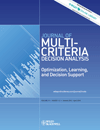
Journal of Multi-Criteria Decision Analysis
Elevating Decision Sciences through Rigorous AnalysisThe Journal of Multi-Criteria Decision Analysis (JMCDM) is a distinguished academic publication dedicated to the interdisciplinary field of decision sciences and management strategies. Published by WILEY, this journal has been a vital resource for researchers and practitioners looking to enhance their understanding of complex decision-making processes since its inception in 1992. The journal is recognized for its rigorous peer-review process and currently holds a Q3 ranking in Decision Sciences (miscellaneous) and a Q2 ranking in Strategy and Management, highlighting its significant contributions to the field. With impressive Scopus rankings, including Rank #19 in General Decision Sciences, JMCDM provides a platform for innovative research that influences theory and practice alike. Although not completely open access, it maintains a robust electronic presence through its E-ISSN: 1099-1360. Researchers, professionals, and students can expect to find comprehensive analyses, methodological advancements, and diverse case studies that support informed decision-making in a variety of contexts.
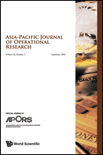
ASIA-PACIFIC JOURNAL OF OPERATIONAL RESEARCH
Pioneering Insights in Management Science and OperationsASIA-PACIFIC JOURNAL OF OPERATIONAL RESEARCH is a premier academic publication dedicated to the dynamic fields of operational research and management science, published by WORLD SCIENTIFIC PUBL CO PTE LTD. Located in Singapore, this journal has been pivotal in contributing to the dialogue and development of innovative strategies and methodologies within the operational research community since its inception in 1991. With a focus on practical applications and theoretical advancements, it serves as an essential resource for researchers, practitioners, and students seeking to enhance their understanding and expertise in decision sciences. The journal has gained recognition with a Q3 ranking in Management Science and Operations Research in the 2023 category quartiles, underlining its significance in the academic landscape. The Scopus ranking positions it reasonably well, attracting contributions that address both contemporary and emerging challenges in the field. Although the journal operates under a traditional publishing model, it offers vital access to a wealth of high-quality research, making it a go-to source for key findings and methodologies in operational research. Through its rigorous peer-review process, the journal aims to foster collaborative efforts that advance knowledge and practice across the Asia-Pacific region and beyond.

EURO Journal on Decision Processes
Navigating the Dynamics of Decision Processes TogetherThe EURO Journal on Decision Processes, published by ELSEVIER, is a premier open-access journal dedicated to the multidisciplinary field of decision-making processes in various contexts, including applied mathematics, business, and management. Since its inception, the journal has leveraged its platform to foster innovative research and discussions among scholars and practitioners. With a commendable impact reflected in its 2023 Scopus rankings and Category Quartiles, specifically Q2 in Applied Mathematics and Business, Management and Accounting, the journal stands as a vital resource for advancing the understanding of decision-making methodologies and frameworks. Notably, the journal has embraced open access since 2021, increasing visibility and accessibility for researchers and students alike. The scope encompasses a wide array of topics, reflecting the complexities of decision science in today's dynamic environments, making it an essential publication for those seeking to contribute to and engage with the frontier of decision processes research.